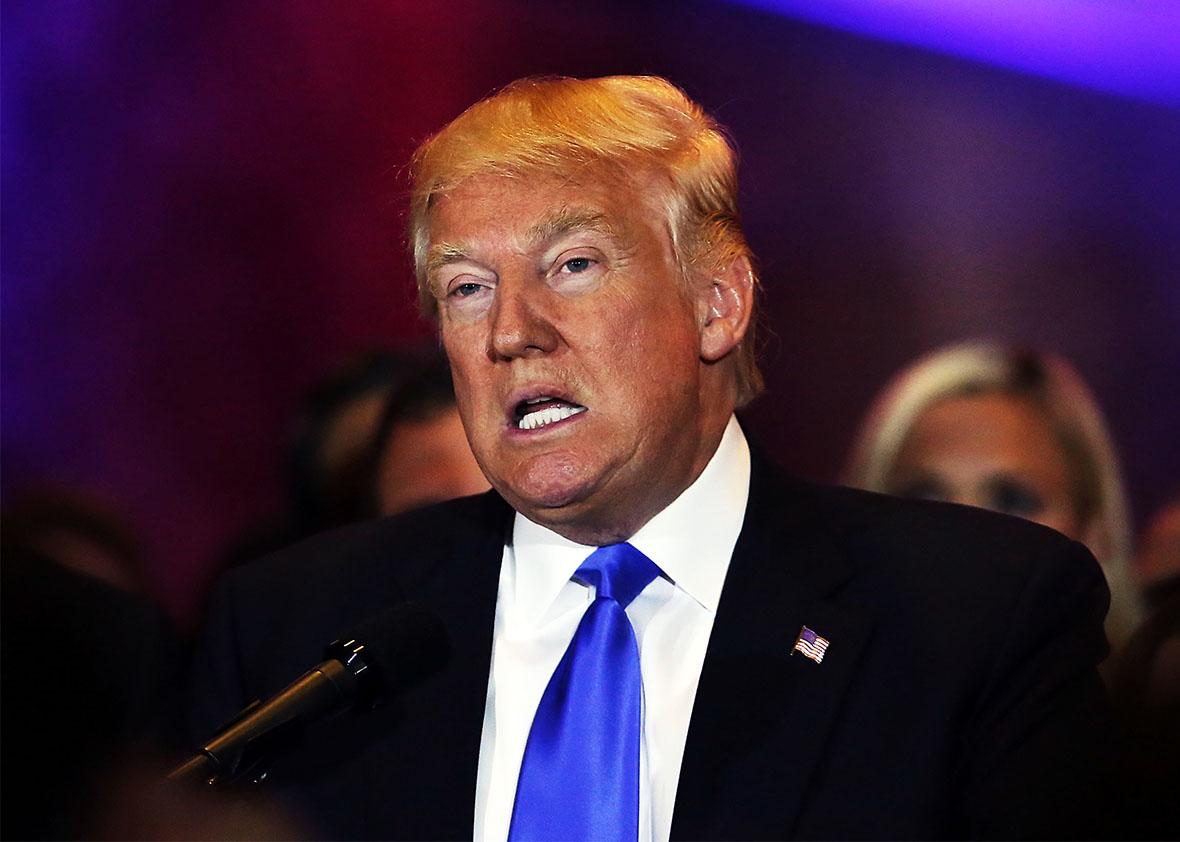I want you to try something.
Take a breath and say this aloud: Donald Trump will be the Republican Party’s nominee for president of the United States.
Say it again: Donald Trump will be the Republican Party’s nominee for president of the United States.
I know. We’re far past the point that this shocks anyone. It’s been in the cards since his huge wins in New Hampshire and South Carolina and his massive sweep on Super Tuesday in early March. For a long time Trump’s nomination has been the most likely outcome of this chaotic farce of a presidential primary. And Tuesday’s results just make it impossible to deny any longer.
By the time he took the stage at Trump Tower in New York City to celebrate his victories, Trump had won 61 percent of the vote in Delaware, 58 percent in Pennsylvania, 55 percent in Maryland, 58 percent in Connecticut, and 64 percent in Rhode Island. Excluding Pennsylvania’s unbound delegates—which, as my colleague Jim Newell notes, he could also win—Trump now has around 950 delegates, just a few hundred short of the 1,237 he needs to win the nomination outright.
What this means is that Trump is just a few states away from final victory. (You can play with the numbers using this calculator.) A win in Indiana, where he leads, next to likely wins in California, New Jersey, and West Virginia, puts Trump within 100 delegates of an unqualified triumph. If he fares well in New Mexico and Oregon—which use proportional distribution—he moves closer to the nomination. If he wins two to three of the four remaining contests—Montana, Nebraska, South Dakota, and Washington—then he wins, period, and becomes the Republican nominee for president of the United States.
Say it again. Donald Trump will be the Republican Party’s nominee for president of the United States. Take it in. Meditate on it. Roll it around on your tongue. Remember the taste notes, the acrid weirdness of it. It’s important never to let that sentence feel normal.
Trump’s success—his rapid climb to one of the summits of American politics, a major party nomination—has never happened before. We have never seen a nominee like Donald Trump. It’s unprecedented.
It’s not just that Trump doesn’t have the résumé, since that’s not too unusual. One of our most celebrated presidents, Abraham Lincoln, had a single House term to his name, while one of our most forgettable, William Henry Harrison, had spent six years and change in Congress. Famously (or infamously, depending on where you stand), our current president won the Democratic nomination after two terms in the Illinois state senate and a half- term in the United States Senate.
It’s not just that he lacks elected experience, either. We’ve seen those men before too. Herbert Hoover was an internationally known philanthropist and secretary of commerce but never served in elected office. The same goes for one of the most popular presidents, Dwight Eisenhower, and one of our most controversial, Ulysses S. Grant, who were career soldiers and war heroes before winning the White House. As nominees for president, both Horace Greeley and Wendell Willkie come close, in that they were businessmen with little or no experience in government at all, but they were prominent men in civic life, which is a kind of experience.
It’s not that he’s vapid and ill-informed about the world. Warren G. Harding was president, after all. And the history of American politics is riddled with men who climbed far beyond their abilities.
Nor is it that he’s an outsider—so were William Jennings Bryan and Ross Perot.
It’s not even that he’s racist or nativist or violent in his rhetoric. So were presidents Andrew Jackson and James K. Polk. So were candidates George B. McClellan and George Wallace. It’s only in the last generation that American politics has filtered out the explicitly prejudiced, Trump notwithstanding.
No, what makes Donald Trump something new in American political life is that he’s all of these things at once: a racist, nativist demagogue with few ties to government, no experience in public office, no service in the armed forces, and little to no knowledge of anything involving governance, from policy to basic questions like, “What is the Supreme Court, and what does it do?” If you conjured all the ignorance and arrogance in America and gave it human form, you would have Donald Trump, give or take a spray tan.
Americans have never chosen someone like him to lead one of their two major parties. And now that he’s the presumptive nominee, Americans will—for the first time in their history—have a choice of whether they’ll put him in the Oval Office, to lead the country for four years.
They almost certainly won’t. Trump is one of the most unpopular figures in recent memory, if not the most unpopular presidential candidate in modern American history. He unites the entire Democratic Party coalition against him at the same time that he divides and fractures the Republican Party. A political party that floats a parallel campaign against its own presumptive nominee is not a party united enough to wage a full effort for the presidency. Most Republicans may well vote for Trump, but “most” isn’t enough to carry the day.
This shouldn’t comfort you. By definition, a presidential nominee has a decent chance of becoming president, where decent can mean anything from 1 to 100 percent. A sudden recession, a terrorist attack—these are the unknown unknowns that can hand an election to a challenger.
I don’t think Donald Trump will become president. But he could. And that’s terrifying.
